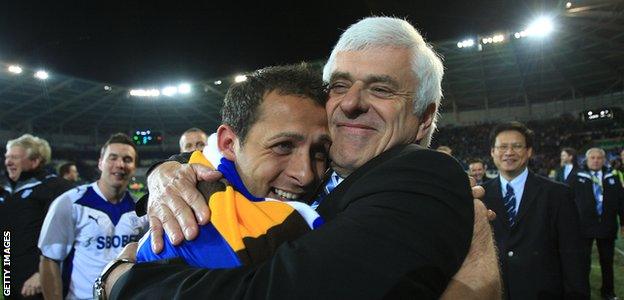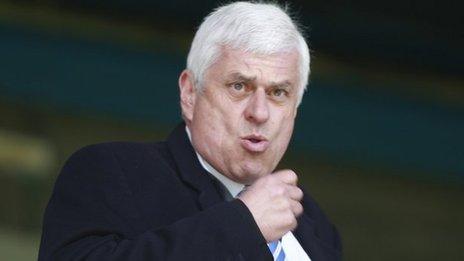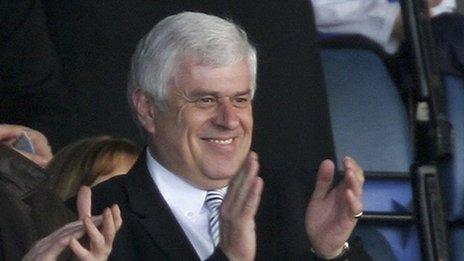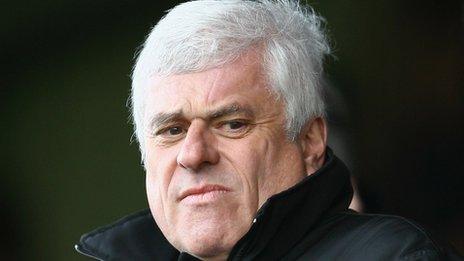Transfer window: Peter Ridsdale's guide to deadline day
- Published
Transfer Deadline Day: Kevin Kilbane visits Preston North End
Peter Ridsdale is best known for being chairman at Leeds United when they were a buying club, and Cardiff City when they were a selling one.
He has been behind some mega-money moves at the top of the Premier League, and also kept clubs afloat by thrashing out last-minute deals.
He is currently an advisor to League One side Preston North End, having also had roles at Barnsley and Plymouth.
Here is his guide to the transfer window and deadline day.
Find the fax machine
I remember the first transfer window in 2002 when I was at Leeds United and I'd been dealing with Tottenham chairman Daniel Levy for weeks about the potential transfer of Robbie Keane.
In the end we were playing Birmingham City at St Andrew's. Was the deal getting done? Wasn't it getting done?

Robbie Keane (centre) scored 13 Premier League goals for Leeds, who lost £5m on him
I was trying to watch the game. And literally at two minutes to five - the deadline was at five - we managed to get the transfer through. Our club secretary was in the Birmingham secretary's office trying to get the faxes through.
Striker Keane joined Leeds for £12m in 2001 from Inter Milan after an initial loan spell and left for Tottenham for £7m in 2002 after the club entered financial difficulties.
Squeeze every last penny out of a deal
If a player doesn't want to play for you, the best you can do is get the best price for the club. A classic example was when I sold Rio Ferdinand. He returned from the 2002 World Cup and came into my office on his first day back and said he wanted to go to Manchester United.
Once we knew he was going, the cat and mouse game is how much can you get for him. Ultimately we got £30m. It was difficult. Once you know the player is going and where he wants to go to, how do you push the price up so the other club don't say 'we know he's coming to us so we'll keep the price depressed'? But we managed to get them from an initial bid of £18m up to £30m, so it was a job well done.
Use it to keep your club alive
At Cardiff we brought in almost £30m from selling players in five years. We were £30m in debt; we had no cash. My job was to sell at least £5m worth of players each year to keep the club alive. The challenge was to hold your nerve and get the highest price possible when we needed the cash.

Michael Chopra (left) was sold for £5m but went on to rejoin Cardiff for £4m
When striker Michael Chopra went to Sunderland, the initial bid was about £1.5m-£2m and we eventually got £5m. That money kept the club alive that summer. The first bid for midfielder Aaron Ramsey from Manchester United and Arsenal was around £1m. Now I think I sold him on the cheap for £5m but he'd only played a few games at the time.
It was holding one's nerve - knowing that you needed to sell in order to pay the payroll at the end of the month. You had to weigh up at what point does the other club pull out versus you negotiating to get a higher price.
Chopra joined Cardiff from Newcastle for £500,000 in 2006 and left for 10 times that figure a year later to Sunderland. He rejoined Cardiff, initially on loan, little over a year later and signed permanently for £4m.
Ramsey was a Cardiff youth-team product who left the club for Arsenal after 22 appearances.
Don't cut corners on medicals
Savage's transfer window secrets
I walked into a club a couple of years ago and there was a player who hardly played for the team and never kicked a ball while I was there. He had been signed on a lot of money yet, I'm told, didn't have a medical before signing. That's like pouring money down the drain.
You've got to be professional. If you can't complete a transfer to your satisfaction, and that includes a medical, then you don't do it.
That's another thing the transfer deadline does - it puts people under pressure. The cost of getting relegated from the Premier League is so enormous. If you find yourself in the bottom six in the league in January, the need to survive is so intense that perhaps people cut corners. The problem is that can come back to haunt you.
Be careful if you listen to the fans
One of the lessons I've learned over the years is nobody prepares you for the spotlight, profile and pressure of being in charge of transfers. When I was in charge of Leeds, I was far more responsive to supporters' needs and reactive to managers' demands than perhaps I should have been. I learned an interesting lesson.
During my five years at Cardiff, I took a view that if we were doing the right thing, I could live with myself. Whatever the external pressure, I'd learned my lesson. I did a far better job buying and selling players at Cardiff than I did, perhaps, in some of the occasions when I was at Leeds.
Try not to leave it too late
Once there is a determined deadline, people always think 'I've got a big longer, I've got a bit longer' and then you start to panic. It's the most amazing last day - you just have to watch the television yourself.
It's people thinking 'if I hang on they'll be more desperate to sell because they need the money so will sell cheaply'. And on the other hand people are saying 'if I hang on, they're desperate for the player so will pay a higher price'. It creates an artificial period so whether you're buying or selling, it changes the price structure. From a supporter's point of view, it's really exciting.
'Artificial' window should be scrapped
I'm not in favour of transfer windows. I think a lot of work gets done late in the day - they inflate prices. People are desperate to avoid relegation or to sell players.
It's an artificial period in the normality of running a football club - it puts too much stress on everybody.
The sooner it disappears the better. A lot of clubs end up spending more money on average players than they ought to and some clubs end up getting an undervalue for players they've sold.
- Published5 November 2013

- Published17 April 2013

- Published6 December 2011

- Published6 December 2013

- Published7 June 2019
